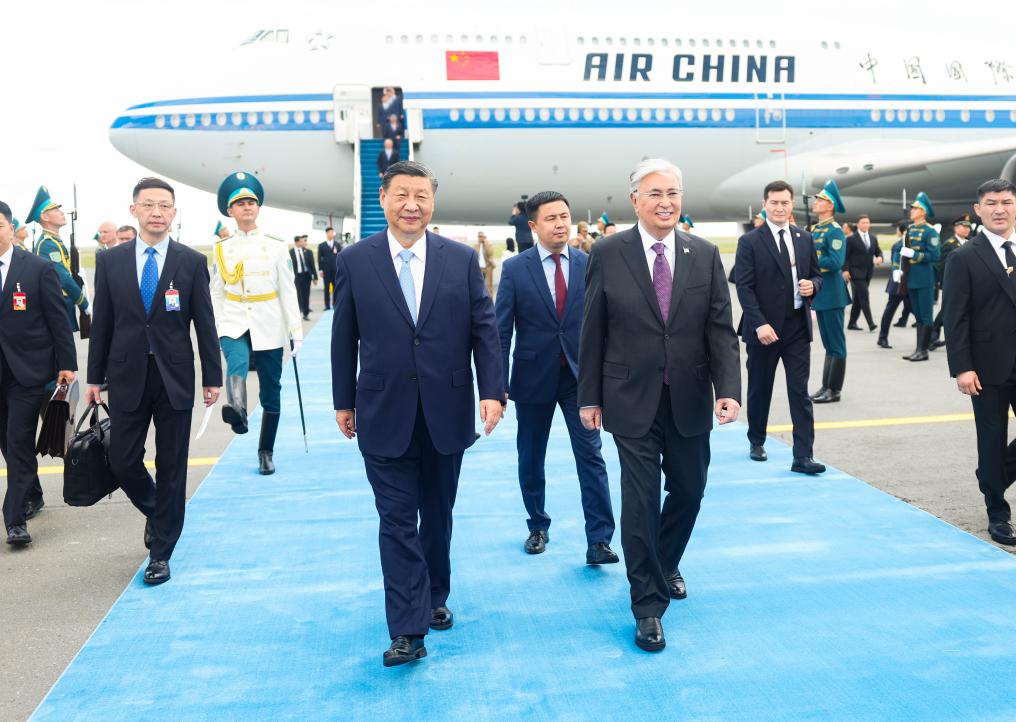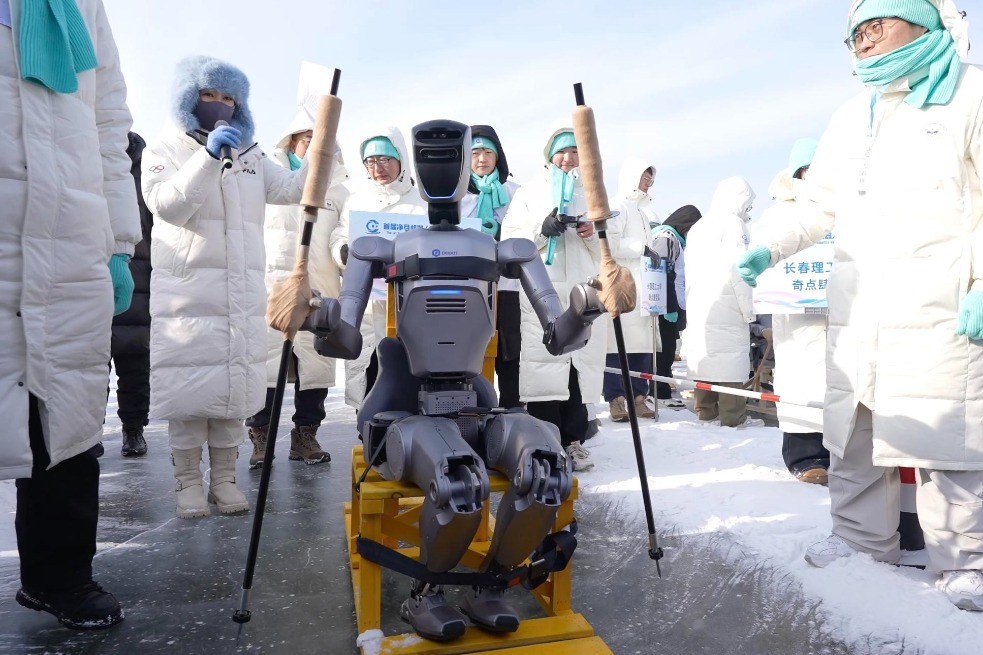Xi arrives in Kazakhstan for 24th meeting of SCO Heads of State Council and state visit


President Xi Jinping arrived in Kazakhstan on Tuesday for a state visit and to attend the 24th Meeting of the Council of Heads of State of the Shanghai Cooperation Organization.
This is Xi's fifth visit to Kazakhstan and the second one in less than two years, following his previous state visit in September 2022. The visit this time is expected to bring a renewed focus on the multifaceted aspects of bilateral ties and cooperation.
Calling the China-Kazakhstan partnership "unique," Xi said upon his arrival here that the everlasting friendship of the two nations has grown stronger over time, and set an example of solidarity, mutual benefit, and mutual success between neighboring countries.
In a series of meetings scheduled with Kazakh President Kassym-Jomart Tokayev, Xi is expected to engage in detailed discussions aimed at further strengthening cooperation between the two nations. The focal points of these talks are expected to cover trade and investment, infrastructure development, and cultural and people-to-people exchanges.
"The leaders of our countries launched a new 'golden 30 years' of cooperation between Kazakhstan and China," said Gulnar Shaimergenova, director of Kazakhstan's China Studies Center, referring to a joint announcement by the two heads of state during Xi's visit in 2022.
With Kazakhstan-China relations growing at a high level, it is believed that Xi's visit to Kazakhstan will open up new prospects for bilateral cooperation, she said.
During Tokayev's visit to China in 2019, the two countries decided to elevate their ties to a permanent comprehensive strategic partnership. Speaking at a daily briefing in Beijing on Monday, a Chinese Foreign Ministry spokesperson said that it is expected that Xi's visit this time will further strengthen bilateral relations.
The deepening mutual trust and political ties between China and Kazakhstan have been accompanied by a remarkable growth in their trade and economic cooperation over the past three decades.
China was Kazakhstan's largest trading partner in 2023, with two-way trade up by 32 percent year-on-year to reach 41 billion U.S. dollars. Key exports from Kazakhstan to China include crude oil, metals, and agricultural products, and in turn China has supplied Kazakhstan with machinery, electronics, and consumer goods, according to Kazakh government data.
The Central Asian nation has also become a critical partner in the China-proposed Belt and Road Initiative (BRI), which aims to boost connectivity and promote global prosperity through infrastructure development and trade and investment facilitation. It was in Kazakhstan in 2013 that Xi first proposed the initiative of the Silk Road Economic Belt.
"This marked a magnificent chapter in Belt and Road cooperation between our two countries. And the development of China-Kazakhstan relations has since entered a new stage," Xi said in a signed article in the Kazakhstanskaya Pravda newspaper and Kazinform International News Agency on Tuesday.
Since then, the two countries have made significant strides in enhancing connectivity and economic integration through various BRI projects.
Among the recently completed and commissioned ventures are the Zhanatas wind farm, the Turgusun hydropower station, and the modernization of the Shymkent Oil Refinery. These developments underscore the robust energy cooperation fueling both countries' development. The China-Kazakhstan crude oil and natural gas pipelines are also operating with remarkable stability and safety, ensuring a consistent energy supply vital for both economies.
This dynamic partnership has also extended into transportation infrastructure, with key transport and logistics hubs, such as the terminal in Xi'an, the Western Europe-Western China Highway, and the China-Europe Railway Express, functioning seamlessly.
BRI's support for cross-border transport infrastructure has benefited Kazakh connectivity, according to a World Bank report, entitled "South Caucasus and Central Asia: The Belt and Road Initiative Kazakhstan Country Case Study."
For more than a decade, Kazakhstan has invested substantially to improve its own transport network, but due to more limited improvements in trade facilitation and limitations of resources in many neighboring countries, the gaps have been difficult to fill.
The focus of BRI on expanding transport infrastructure and economic integration and China's drive to connect its western and central regions more effectively to Europe and to West Asia provide an opportunity to address these gaps, according to the World Bank report.
"Kazakhstan is likely to be among the larger beneficiaries of the BRI," it concluded.
Meanwhile, consensus on deepening cultural and people-to-people exchanges is expected to be reached during Xi's visit. Both nations have for long recognized the importance of fostering greater understanding and friendship between their peoples, viewing cultural exchanges as one major cornerstone of their bilateral relationship.
So far, a China-Kazakhstan agreement on mutual establishment of cultural centers has been signed. Chinese and Kazakh filmmakers have co-produced a film entitled "The Composer," which is their first co-production. Bilateral programs for cultural cooperation, including a Chinese university campus in Kazakhstan, a Luban Workshop, and a center of traditional Chinese medicine, have been implemented.
Thanks to the mutual visa-exemption arrangements, a total of 600,000 cross-border trips were recorded in 2023. In the first quarter of this year, the number of visits in both directions amounted to 200,000 and are expected to reach a new high, official data from both sides have shown.
In an exclusive written interview with Xinhua before Xi arrived here, Tokayev emphasized the significance of cultural and people-to-people communications between the two countries, as the opening ceremony of the "Kazakhstan Tourism Year" in China was held in March in Beijing.
"Cultural and people-to-people cooperation plays an important role in strengthening bilateral ties and fostering friendship between the peoples of our countries," he said.
























